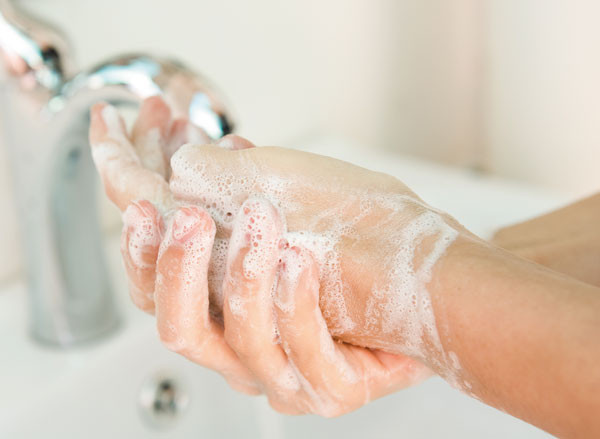
Trying to lose weight? Be careful not to lose muscle

Is your skin problem actually an autoimmune condition?

People with diabetes face higher risk of hearing loss

Antibiotic-free fixes for recurrent UTIs

Musculoskeletal syndrome of menopause: When menopause makes you ache all over

When can older women stop getting mammograms?

To lose weight, especially harmful belly fat, combine diet and exercise

Can men hold off on treating recurring prostate cancer?

The 7 types of rest and why we need them all

What are the early warning signs of cervical cancer?
Men's Health Archive
Articles
A new look at colon cancer screening
Don't be intimidated about screening tests. The latest guidelines suggest you can choose from multiple strategies.
Image: Bigstock
Colon cancer continues to be the country's second leading cause of cancer-related deaths and the third most common cancer in men, according to the CDC.
It almost always develops from precancerous polyps (abnormal growths). Screening tests, which are recommended for men ages 50 to 75, help find and sometimes aid removal of polyps before they become cancer. (Men older than 75 may still benefit, depending on their health.)
Higher levels of omega-6 fatty acids may lower death rates in older men
A new study found that high levels of omega-6 fatty acids in the subcutaneous adipose tissue—the layer of fat just beneath the skin—correlated with lower death rates among older men. Omega-6s mostly come in the form of linoleic acid, found in plant oils (such as corn, soybean, and sunflower oils) as well as nuts and seeds. Linoleic acid is known to shrink levels of bad LDL cholesterol in the blood, which can contribute to lower incidence of heart disease.
A better sex life requires more than popping a pill
Image: iStock
The never-ending advertisements for erectile dysfunction drugs seem to suggest that popping a pill is all it takes to guarantee a great sex life for men dealing with this challenging problem.
But a satisfying sex life takes a lot more than functioning body parts — erectile dysfunction can set in motion a cycle of emotional and relationship problems. And "fixing" the ability to achieve an erection may uncover other sources of sexual dysfunction, such as low libido, difficulties with arousal, or sexual issues in a partner.
Walking while golfing: Is this sufficient exercise?
Studies of golfers have found that playing 18 holes is about equal to brisk walking in terms of intensity—even though golf walking is stop-and-go. However, in order to gain the maximum cardiovascular benefit from exercise, people may want to add a day or two of higher-intensity activities, such as running, tennis, or something similar that raises your heart rate.
Join the healthy heart trend
The rates of heart disease have dropped over the past decade. How can you be part of this pattern?
Image: Photos.com/ Thinkstock
Heart disease continues to be the No. 1 cause of death among men, but there is some good news—fewer older adults have heart disease. A recent report from the National Health and Nutrition Examination Survey found the rates for this condition among people age 60 and older have fallen from 19.5% to 14.9% in the past decade.
What caused this downward trend? And how can you follow?
Meditation may ease anxiety from active surveillance
A mindfulness-based stress reduction program (MBSR) can help control anxiety among men who follow active surveillance for prostate cancer. The wait-and-see approach can make men feel so uneasy about their condition that they opt for treatment with radiation therapy or surgery when it is unnecessary. MBSR not only eases anxiety levels, but also inspires men to be more proactive about their health and adopt lifestyle changes like a proper diet and exercise.
You can protect yourself against superbugs
Some simple preventive measures can keep antibiotic-resistant bacteria at bay.
Image: hxdbzxy /Thinkstock
Although the Zika virus got more publicity throughout the summer, another—and even scarier-sounding—microbe also made headlines. Dubbed a new "superbug," strains of E. coli resistant to the antibiotic colistin were found in the United States. Colistin is a drug often used when others fail to control a bacterial infection. Fortunately, the bacteria weren't resistant to other antibiotics, which cleared the infections. "Although this particular case of antibiotic resistance may not be as dire as the media made it sound, in general these increasingly high-level resistances are an enormous problem," says Dr. Sarah Fortune, professor of immunology and infectious diseases at Harvard T.H. Chan School of Public Health.
Why superbugs are such a problem
Like other forms of life, bacteria are always evolving to become stronger and survive longer. One of the ways they increase their chances of survival is to acquire genes that help them resist threats—including natural enemies like viruses and man-made weapons like antibiotics. These genes can spring up within a bacterium through mutations and are passed down to subsequent generations of the microbe. In addition, they can be found on rings of DNA called plasmids, which can be transmitted to other types of bacteria, enabling the resistance to spread wider and faster. The E. coli strains discovered in 2016 raised concern because they carry the colistin-resistance gene on plasmids and thus have the potential to transfer the plasmids to bacteria that are already resistant to several other antibiotics.

Trying to lose weight? Be careful not to lose muscle

Is your skin problem actually an autoimmune condition?

People with diabetes face higher risk of hearing loss

Antibiotic-free fixes for recurrent UTIs

Musculoskeletal syndrome of menopause: When menopause makes you ache all over

When can older women stop getting mammograms?

To lose weight, especially harmful belly fat, combine diet and exercise

Can men hold off on treating recurring prostate cancer?

The 7 types of rest and why we need them all

What are the early warning signs of cervical cancer?
Free Healthbeat Signup
Get the latest in health news delivered to your inbox!
Sign Up









